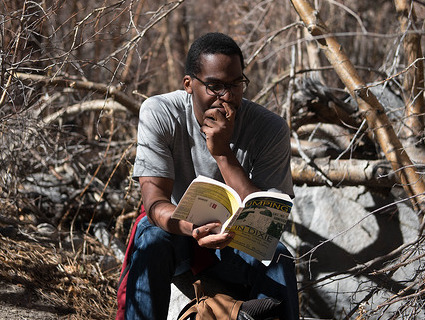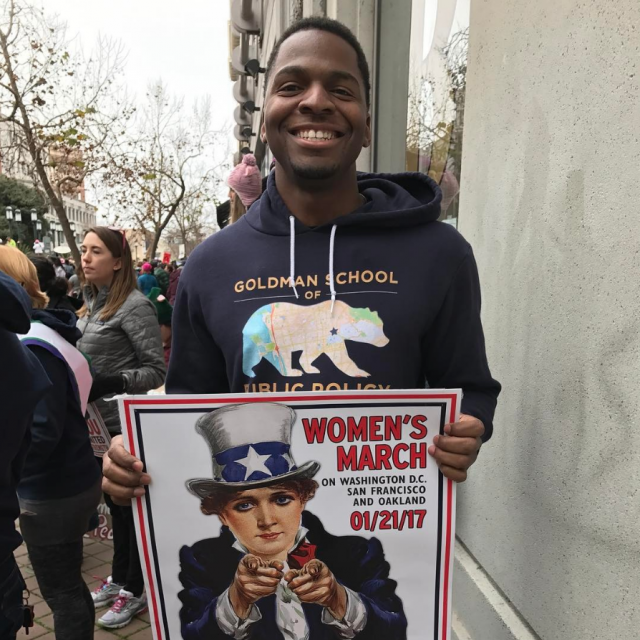Measuring California’s Energy Service Affordability (MS ’19)
Christian is fascinated by energy end-uses’ effect on communities’ economic and political well-being. While his formal scientific background is in biorenewable resources, his focus is on the sustainable development of holistic energy solutions based on socioeconomic, geographic, and natural resource characteristics for communities both domestic and developing abroad. As well, Christian is interested in the socioeconomics of renewable energy infrastructure and promoting evidence-based policy for leading the US towards clean energy integration and adoption that economically empowers all American citizens. Christian has a BS in Biological Systems Engineering from Iowa State University.
Contact:
Email: cgmiller@berkeley.edu
LinkedIn: https://www.linkedin.com/in/cgmiller128/
STUDENT SPOTLIGHT (2018)
“My background has allowed me to not only consider the typical ‘best’ case when examining different policy and technical variables but also all the little shades where ‘solutions’ won’t work for everyone.”
“ERG has opened the entire Berkeley campus up to me, allowing me to gain a multifaceted skill set.”
“It has been exhilarating working on these timely issues in a state that is at the forefront of renewable energy policy.”
What have you been working on that most excites you? Please describe your work.
I’ve been tackling questions that challenge the perception what a holistic energy system is and represents. For some reason, many hold the opinion that we need to maintain the previous fossil fuel status quo, especially coal, to support substantial amounts of labor. Along with some research here in the RAEL lab that already proved this not to be the case, I proposed some methodology to analyze the job potential for battery storage systems and other ancillary grid systems. In that same vein, I have done some critical analysis of the techno-economic potential of biomethane as building fuel decarbonizer in the face of pure electrification enthusiasm.
What difference has researching with ERG made for you?
ERG has opened the entire Berkeley campus up to me, allowing me to gain a multifaceted skill set. I’ve been able to fortify my knowledge of the electric grid in the Department of Electrical Engineering and Computer Sciences (EECS), learn about energy market economics at the Haas Business School, gain exposure to energy project development at the Berkeley Law School, and examine renewable energy policy considerations at the Goldman School of Public Policy (GSPP). All of this has married into a well-rounded perspective, enriching my research and future job prospects.
Christian finds a quiet location to read Bullard’s “Dumping in Dixie.” (Credit: Salma Elmallah)
Why did you choose ERG? What made it unique for you?
I chose ERG because I wanted a space where I could become an energy generalist and specialist at the same time. My previous background is in biorenewables, more specifically biofuels. I wanted to broaden my skill set to be able to study all the angles of energy use, planning, and development (generalist). But, I have also sharpened my wide range of skills—from econometrics and predictive modeling to a breadth of engineering, economic, and policy considerations for a future in energy analysis, consulting, and advising (specialist).
How has your background been a part of your research and time at ERG?
My identity as a cis-gender Black American male from the South and Midwest is one I certainly hold with pride and constant deference. Though my work at ERG hasn’t focused so much at this intersection, I find myself consistently considering viewpoints of vertical equity amongst different socioeconomic classes, horizontal equity amongst different races, and geographic equity, especially regarding markers of development for regions with varied natural endowments and political dynamics. My background has allowed me to not only consider the typical “best” case when examining different policy and technical variables but also all the little shades where “solutions” won’t work for everyone.
Christian prepares for the Women’s March (Credit: Christian Miller)
What advice do you have for prospective students? What can they expect?
Well, prospective students, be prepared to shape your experience here at ERG and Berkeley. There are so many angles and approaches one can take here at ERG which can be daunting but also quite rewarding. While here in this academic playground, make sure to talk to people—your lab group, other ERGies, alums in the field, and professors—to get as much information about the skills and knowledge needed to be an effective researcher or practitioner in this space and plan accordingly.
In what ways is the work that you’ve been involved at ERG “cutting edge”?
Since arriving in Berkeley, I have been in some of the most significant energy policy discussions facing California. I worked in a group suggesting mechanisms to stabilize the credit price-signal for the Low Carbon Fuel Standard credit market. I evaluated the methodology for battery energy storage in the state Renewables Portfolio Standard. I also implemented modifications to the RPS procurement program as an advising fellow for a CPUC Commissioner. During my time at NRDC, I performed analyses to inform the conversation around building decarbonization legislation before the California State Legislature. It has been exhilarating working on these timely issues in a state that is at the forefront of renewable energy policy.
Christian, alongside Berkeley Energy and Resources Collaborative (BERC) colleagues Michelle Levinson, Zineb Bouzoubaa, Cynthia Fernandez Preda, and Jesús Guzmán, accepting one of the six Chancellor’s Advisory Committee on Sustainability (CACS) Sustainability Awards given in 2018. (Credit: Jesús Guzmán)
Who have you been working with at ERG?
I have mostly worked with Dan Kammen and the Renewable and Appropriate Energy Lab (RAEL). The experience has been tremendously rewarding. There is always something new and exciting to get involved with. Every lab meeting, I’m making connections and refining my research interest and goals.
How do you define ERG’s mission in terms of “sustainable environment” and “just society”? How do you or your work contribute to this?
To me, this means not shunning the idea that EVERYONE has a right to the betterment of life, for which the natural resources of our planet mainly hold the key. But, in the pursuit of said betterment, we must exercise caution and thoughtfulness in regard to the use of said resources. I uphold this in always considering environmental quality and equitable access in my analyses.
Christian has been heavily involved with Resistance School@Berkeley, an education program for activists and changemakers. He is featured in the video above.
Where do you envision yourself after ERG?
If only I had a crystal ball! Nevertheless, my next steps are taking me to England where I hope to get a job utilizing my Master of Public Policy and Master of Science in Energy and Resources degrees. Specifically, I want to work at the intersection of energy project development, techno-economic analysis, and resource planning.


